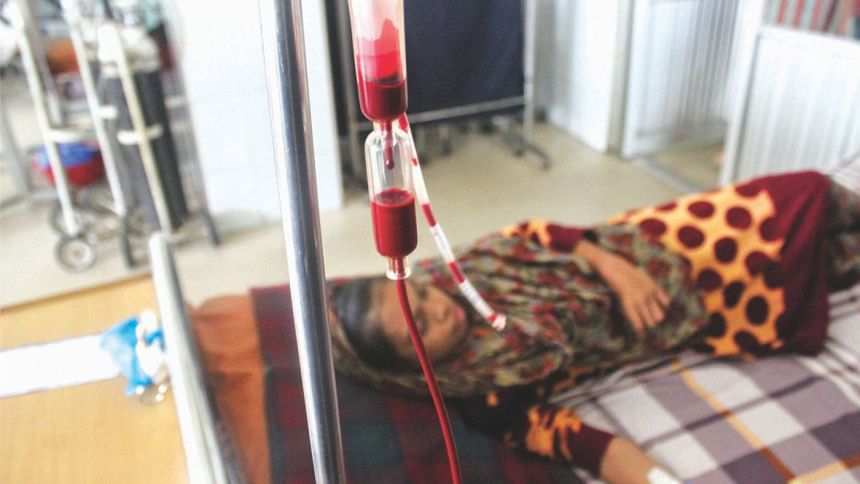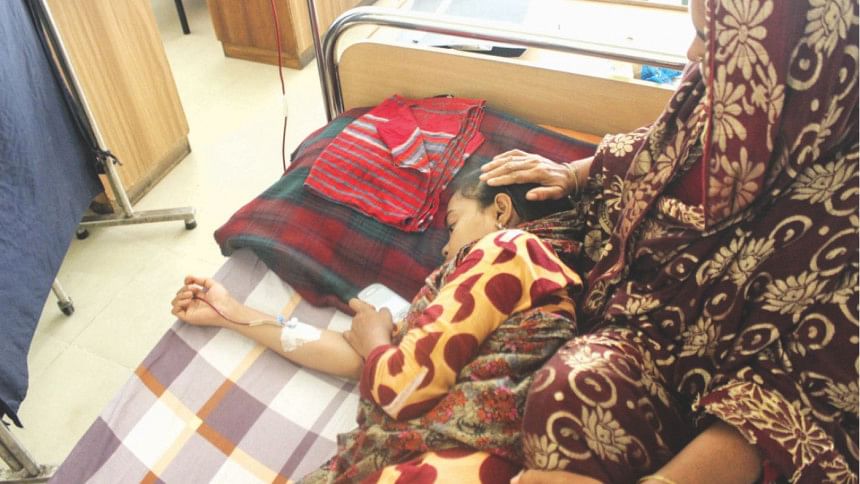Going gently into that good night

Sabekun Nahar, two-and-a-half-years old, plays on her mother's lap in a stark, sterile ward of Ashic Palliative Care Unit, the country's first-ever paediatric palliative care unit. She is full of life—like other children her age—but her swollen belly, skinny limbs and bald head tell a different story.
Nahar was diagnosed with soft tissue sarcoma (stomach cancer) last year, which is now terminal.
"When I gave birth to her, everyone was very happy—she was the first girl in our family. I prayed to the Almighty that He blessed me with Nahar. I don't know why He now wants to take that gift back," says 30-year-old Shimu Akter, Nahar's mother.
After continuing cancer treatment for more than a year at Dhaka Shishu Hospital and Bangabandhu Sheikh Mujib Medical University (BSMMU), Akter was informed that the doctors would not be able to continue her daughter's treatment as her physical condition was not good enough to carry on with surgical procedures.
"Though her tumour was cut off, it started swelling again, and at one point of time, she was unable to move. Nahar would cry all the time; she couldn't sleep from the pain. You cannot imagine how excruciating it is for a mother to see her baby fighting against such unbearable pain, and not being able to do anything to make her feel good," she says.
Akter consulted a doctor again, who informed her that she should take Nahar to Ashic Palliative Care Unit, where she could get specialised care providing some relief from the pain and irritation caused by cancer.
"What is her condition now?" I ask.
"Comparatively better," she shares. "Earlier, I could not accept that my daughter cannot be cured. But now I have accepted that I might not have her for long. But you know what? At least now I don't need to see my daughter in excruciating agony and feel helpless. I was afraid we wouldn't be able to afford the care, but Ashic pays the majority of the costs."
"I want my daughter to live in comfort, no matter the number of days she stays with me," Akter smiles sadly.

Comfort rather than cure
When treatments of serious illnesses, such as cancers, chronic obstructive pulmonary diseases (COPD), leukaemia and lymphoma or kidney failures take toll on the body, outweighing the benefits of such treatments, the goal of a patient's care starts to change. During this time, s/he might need comfort rather than cure. Palliative care helps patients spend their remaining time on earth in relative comfort, alleviating their pain.
In Bangladesh, however, the healthcare system is prevention and cure-oriented—to a point that at times it ignores a patient's well-being. As Dr Nezamuddin Ahmed, Professor and Chairman, Department of Palliative Medicine, Centre for Palliative Care, BSMMU argues, "There is a denial of the inevitability of death and the need to provide specialised comfort to those with terminal diseases and limit their physical, social, psychological and spiritual sufferings."
When curative treatments fail at hospitals, patients like Sabekun Nahar are discharged and parents usually take them home. "But there might be symptoms, for example, intolerable pain and irritation, nausea, decreasing sodium levels in the blood, restlessness, breathing difficulties and so on, and the family members often don't know what to do to reduce the pain of the patients," says Dr. ASM Munim Hossain, Medical Officer, Ashic Palliative Care. Palliative care doesn't only address a patient's physical sufferings but also focuses on improving the quality of life of patients and their families.
Ashic, for instance, has a wish list programme, whereby palliative care patients are given an opportunity to fulfil their last desire. For example, last June, four-year-old Utsho expressed his wish to visit Shyamoli Shishumela, and so they arranged a trip for him accompanied by one of their supervisors.
Additionally, terminal patients also need psychosocial counselling to deal with the trauma of their suffering and confronting the possibility of death. "I remember a child named Bijoy who died last year. He often wanted to talk to me, and sometimes used to ask me, 'Why has God chosen me?' or 'What sin have I committed?' and so on. We too feel bad, but we would try to make him understand that it wasn't his fault or it didn't make his life any less important," shares Dr Hossain.
It is not just the patient who needs care and counselling, but also family members who live with the trauma of the impending death of a loved one. The palliative care team helps provide emotional support to the family members of the patient and works on bringing some semblance of normalcy back in their lives. Apart from that, family members lack knowledge about the disease, making it difficult for them to understand what assistance to provide or what medical treatment to decide on.

Paltry state of palliative care in Bangladesh
In 2014, World Health Health Assembly, the decision-making body of the World Health Organisation (WHO), recommended its 194 member states to incorporate palliative care in mainstream healthcare globally. Though Bangladesh is a signatory country to the WHO, no significant measures have been taken since then to integrate palliative care.
"Every year, in Bangladesh, approximately 600,000 people can be direct beneficiaries of palliative care, but in reality, we have provided for only 3,000 patients last year," says Professor Nezamuddin Ahmed.
Currently, Bangladesh has limited resources to serve patients who are diagnosed with life-limiting diseases. According to the Quality of Death Index 2015 by The Economist Intelligence Unit, Bangladesh stands 79th in a list of 80 countries in terms of quality of life during terminal days.
Bangladesh has only two government palliative care units—at Dhaka Medical College Hospital and National Institute of Cancer Research and Hospital, with limited resources. BSMMU introduced a unit in 2007 to reduce the sufferings of its patients, which later transformed into the Centre for Palliative Care (CPC) in 2011. This year, a separate 'Palliative Medicine' department has been recognised in BSMMU, where students can undertake a five-year-long post-graduate specialisation in the subject. This recognition makes Bangladesh the 26th country in the world to recognise Palliative Medicine as a medical specialty.
With a dedicated team comprising 10 doctors and 15 nurses, the unit provides most of the medicines free of cost, and receives funding from the Rotary Club of Metropolitan Dhaka (RCMD), Palliative Care Society of Bangladesh and Afzalunessa Foundation. Besides, CPC has been running a project activity in collaboration with the Worldwide Hospice and Palliative Care Alliances (WHPCA) and World Child Cancer (WCC) in Korail slum, to improve the quality of life of 100 older people and 25 children suffering from life-limiting diseases.
There are also a few private initiatives including Ashic Foundation, Delta Hospital Limited, Shanti Oncology and Palliative Care, and World Hospice Bangladesh, which provide assistance at minimal cost, with financial assistance from donors.
There are still miles to go before Bangladesh can bring about sustainable improvements to palliative care. Dr Ahmed argues that the mindsets of our healthcare providers, consumers and policymakers are holding us back. "Ask an undergraduate medical student whether s/he ever read about death and dying, or received a lecture about end-of-life care, s/he will answer with a 'no'. Additionally, healthcare has become a commodity these days—here, no one wants to buy death!" explains Dr Ahmed.
Dr Zohora Jameela Khan, Associate Professor, DMCH, department of Paediatric Haematology and Oncology, who is also well recognised in the field of paediatric palliative care, emphasises the need to incorporate palliative medicine in undergraduate programmes.
"Besides, we need more people to counsel patients and their families. The palliative care team should also visit the family even after the death of the patient, but in reality, how many of us can go out of Dhaka to meet with them?" adds Dr Khan.
Although death is a normal and inevitable part of our life, most of the time, we consider it taboo. But we should be more realistic and give equal importance to a safe death, just like our importance to safe birth, and attempt to make the last days of someone's life as pleasant as possible. Let that be our vow this 'World Palliative Care Awareness Day-2017 (October 14)'.

 For all latest news, follow The Daily Star's Google News channel.
For all latest news, follow The Daily Star's Google News channel. 



Comments